By Mike
In spite of the concerns around online/cyber counselling, an increasing number of analysts have found proof supporting the viability of online/cyber counselling for an assortment of mental issues, including depression, panic disorder, social anxiety, post-traumatic stress disorder, and eating disorders (Skinner & Zack, 2004; Sloan et al., 2011; Stamm, 1998). In addition, some research on counselee/client online counselling has uncovered empowering results. For instance, Cohen and Kerr (1998), Richards and Viganó (2012), and Rochlen et al. (2004) found that counselees/clients show the level of session profundity, fulfilment, and smoothness to be comparable between online/cyber counselling and face-to-face counselling. Furthermore, McKenna and Bargh (2000) and Reynolds et al. (2006) found that counselees/clients who experienced uneasiness and social separation were more likely to create deep connections through online/cyber counselling than through in-person counselling.
We have all experienced many changes in the past year and have had many challenges to overcome. None more so than the world of Counselling and Psychotherapy, which is an industry that traditionally is the idea of two people in a private room and in close proximity. With the Covid restrictions in place where we had to remain at home and only had to make essential journeys the counselling industry had to adapt and a lot of therapists had to move their services online to maintain their livelihoods and meet the mental health need that the pandemic was expected to bring.
Counsellors traditionally are trained to work in a face to face capacity, in which we use body language and non verbal cues and we use a private room to create an environment of safety, security and privacy which allows the client to feel able to talk freely and openly. Working online doesn’t give us many of these physical cues and we are working together at a time where our families (and pets!) are at home so to find that quiet place has been a challenge. I believe this has broken down some barriers to counselling though where we see the client in their homes and they see us in ours and brings a degree of informality to proceedings and makes the whole experience more human. There have been instances where i have had a power cut therefore no Wi-Fi, had deliveries come to the front door and have also seen clients have to tend to children or move room mid session. Where this would be seen as a no no in the therapeutic relationship this actually made the sessions more real and actually added a richness to the proceedings. So counsellors downloaded Zoom and Skype and began working online from a quiet corner of their homes and speaking to people within their own homes. Online counselling courses emerged for therapists to help up skill them and fast forward a year for many therapists working online is an everyday thing.
There are a few advantages to online/cyber counselling. Counselees/clients and pastoral/spiritual counselors or psychologists do not have to meet each other within a physical space, subsequently decreasing the requirement for travel, appointment-related concerns, and overhead costs (Abney & Cleborne, 2004; Cartreine et al., 2010; Green-Hamann et al., 2011). Moreover, counselees/clients can look for services in ways that allow for more prominent anonymity, security, and privacy, thereby improving any potential negative paradigm related to seeing a pastoral/spiritual counselor or psychologist (Barak et al., 2008; Cartreine et al., 2010; McAdams & Wyatt, 2010). Anonymity, intangibility, and more time to structure reactions were imperative to King et al.’s (2006) young subjects. There is less risk of partiality, since age, sex, race, ethnicity, and socio-economic status are frequently more difficult to perceive in a separate environment (Barak et al., 2009; Miller & Gergen, 1998).
My personal journey counselling online began in 2019 where I started an E-counselling diploma which taught me how to work online and delivering therapeutic intervention via telephone, email, instant messaging and video call. I recognised that people were spending more and more of their time online regarding work, social media etc. and that counselling itself may move more and more online as well in the future, but I couldn’t have foreseen my entire practice moving online for over a year! This diploma gave me valuable knowledge and experience working with these platforms. I understood the technical difficulties that could occur, the unexpected arrivals into the room from our clients, the disinhibition factor which meant that as clients were at home and talking online that they may feel more comfortable and therefore more likely to share their feelings as opposed to sitting across a room from someone. I had been seeing clients for a while online when the pandemic hit so I personally felt comfortable working online and ready to help people where I could.
I was delighted to get a job with ‘Irish Online Counselling and Psychotherapy Services’ (IOCPS) in May 2020. I had been following their work for a while and after speaking to their co-founder Mary McHugh her passion and her dedication to the organisation was inspiring to me and something I really wanted to be part of. IOCPS was established in 2011 before online counselling was even seen as a realistic possibility in the world of therapy. The motto of ‘wherever you are, we are’ instantly appealed to me as its dual meaning of helping those who logistically couldn’t find suitable counselling services as they may be working abroad in London, Sydney or Tokyo or those living in rural areas that simply meant they would have to travel for many miles to see a counsellor and the fact of seeing where people are at emotionally led me to think that this was a great place for me to work. This progressive organisation had already many therapists who have been working online since 2011 and that this experience was invaluable in helping the growing numbers of people wanting to access counselling. This year has been a successful one for the organisation and for Mary winning many awards including ‘Online Business Transformation’ and ‘Network Mayo Businesswoman of the Year 2020’ and being asked to go television shows and contribute to national newspapers.
So as the headline suggests ‘Online Counselling and Covid’ I think that one has helped the other over the last 12 months. There has been an upsurge in the need for counselling with isolation, work stress and the lack of social interaction has led to a cocktail of mental health difficulties. Due to the restrictions people trying to access counselling have had to look online for help and this in turn has helped the idea of online counselling really blossom. This allowed counsellors to work and learn new and valuable skills. So, what is going to happen in the future regarding counselling? I think online counselling will continue to grow and people will continue to engage with online counselling even when we are back to ‘normal’. I think there will still be the need for face-to-face counselling and I have had many calls asking whether I was doing in person sessions which sadly I couldn’t accommodate, but I think the benefits of online counselling and the convenience of it all definitely fits in with peoples busy lives. So, in short, online counselling is here to stay, but hopefully Covid won’t be!
Mike Wilkins





